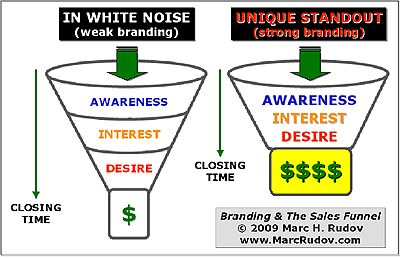It always astounds me when people opine that branding is for consumer products and that industrial purchases are made with pure logic. Neither opinion is even close to accurate. So, why would anyone attempt a “cerebral” sale? Good question. But, it happens all the time.
Branding is the act of creating a unique identity for a company or product. The resultant brand, by definition, must contain a huge emotional component — even for purveyors of industrial, scientific, commercial, and military goods and services. So, when you hear “XYZ Corporation” or “Intelli-widget” and don’t feel a strong interest or desire to own the firm’s product or stock, its brand is a failure.
Every business executive wants to be a hero, to avoid being labeled a chump, and lies awake at night in fear of a botched decision, a lost sale, or a rival trying to usurp him. That’s life in a political nest. Accordingly, any business decision — even signing a purchase order, or recommending that it be signed — carries with it a boatload of emotions.
As I explained in “GutShare vs. Mindshare,” all decisions, in all aspects of life, are made with the gut, which combines the logic and emotion of every issue and produces a visceral feel for whether the decision at hand is correct or incorrect. Anyone who tells you that business execs make logic-only decisions is either naive or possesses a low EQ.
Clogged Sales Funnel
The sales funnel, home of dealflow, is a company’s chief revenue bottleneck. A clogged sales funnel, the consequence of weak branding and poor management, is the bane of every CEO.
In the ideal world, the CEO creates a strong brand, makes his company unique, and employs a salesforce of ordertakers. In the real world, however, most brands are weak, buried in the white noise, and salespeople become the default branders — each with his own product messaging. No wonder the sales funnel is clogged!
The diagram below shows that strong branding — being a unique standout — accelerates the sales process and yields higher revenues. A strong brand, which is like a lightbulb to a moth, reduces closing time and, therefore, the cost of sales — because salespeople easily move prospects from awareness to interest to desire to transaction.
A Result of Strong Branding
Awareness, interest, and desire aren’t cerebral words; they’re emotional words. Buying is, at the end of the day, an emotional/logical process. Cerebral selling doesn’t sell because customers don’t make cerebral purchases.
There are those who believe that, if a customer isn’t moving fast enough to buy a product, he needs more data. Wrong. Either the product in question is blatantly inferior, or, more likely, the customer’s not identifying personally with its benefits — if he even knows them. In essence, he fears that owning the product will lead to personal failure. Can one assess a customer’s fear by peppering him with “logical” arguments? Hardly. Cerebral selling doesn’t sell.
Oracle Corporation, the world’s largest purveyor of database software, succeeded by selling to CEOs while its rivals sold to engineers. Likewise, EMC Corporation, a global leader in storage systems, leapfrogged its competitors by selling to CEOs instead of engineers. In both cases, these vendors understood how to unclog the sales funnel by making technical products indispensable business tools to boards of directors — a result of strong branding.
Rx from The WhiteNoise Doctor™
If you’re in a sales situation and find that the dynamic with the prospect is totally logical, you have one of three problems, maybe all three:
- Weak branding
- Little knowledge of the prospect
- Not talking to the decisionmaker.
Result: no sale or slow sale. Cerebral selling doesn’t sell.
© 2009 Marc H. Rudov. All Rights Reserved.
About the Author

Marc Rudov is a branding advisor to CEOs,
producer of MarcRudovTV, and author of four books


